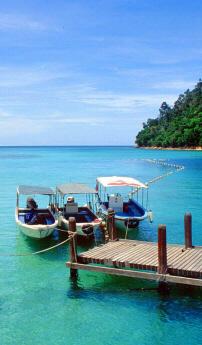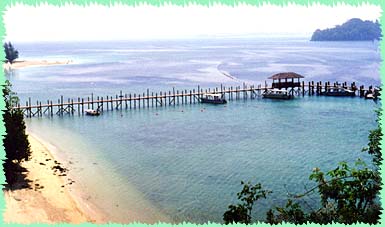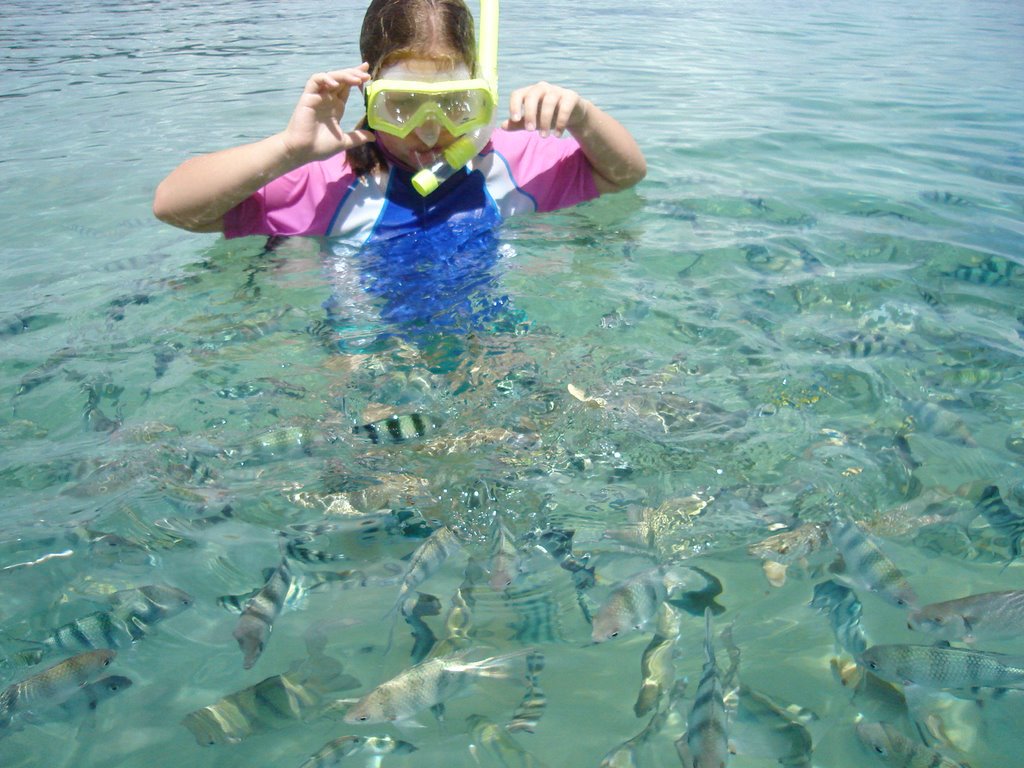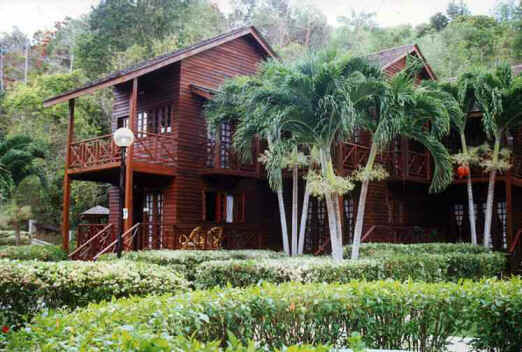Took a boat out to the island of Manukan. Even riding in the boat was
bliss, the prow banging down on the little waves as we sped along, lightly splashed with
spray, hanging on to the rusty rails and the supports for the sun canopy whose welds were
coming apart. These are times when you don’t think at all about yesterday or
tomorrow. I could be a Viking looking with narrowed eyes at new lands to conquer, or a
ragged fisherman in Tahiti.
Then we landed at the jetty on Manukan and saw the swordfish circling in the aquamarine
water. We found our chalet, a two-storey wooden house, simply built of dark hardwood, and
we were like children coming to a playhouse. We entered and exclaimed when we discovered
each light and the rattan chairs and the bedrooms and everything that had been provided,
as if we had never stayed in such accommodation before. In fact we had stayed in the
neighbouring chalet two years ago, and half the pleasure was recognising the
familiar. Just as last time, there were a number of things that didn’t work. So we
had to fetch staff who cheerfully fixed things, or promised to. The water leaked out of
the shower before it reached the shower head, in fact the whole shower-room was pretty
much flooded. But we improvised a shower by using the toilet douche, a feature of Muslim
households where toilet paper is against their religion. But last time we were here,
I’d walked from the jetty, which was a bit far for me [this refers to my chronic
illness]. Then I had instantly gone to the beach, bathed and trodden on a sea urchin,
whose spines had gone into my heel: very painful. All that had finished me off and
I’d spent the rest of the trip lying down as if in a coma, whilst everyone else
wandered the island in the evening, enjoyed barbecues etc. |

These are the boats that you hire to go to
the island

The jetty at which we landed

I have never found a photo which
caputured the beauty of tropical fish as viewed with a simple mask and snorkel. These fish
like to nibble bread and knees |

Feathery fronds of the casuarina
trees, which grow on the beach and give welcome shade
|
But I am
telling you about my latest visit. We spent much of the afternoon snorkelling amongst the
most beautiful and colourful tropical fish you could imagine, whilst they would eat bread
from our hands. And if we had no bread to offer some of them would still approach boldly
and ask for food until you could almost seize them in your hand. And sometimes they would
bite you, as if in frustration at waiting for the food you were supposed to offer. So here
is my diary for that day.
Woke at 7.15 after deep sleep of perhaps 10 hours. Aching, not able to do much, but at
least feeling fortunate! I’m on the balcony of our “cabin”. Birds sing,
people are starting to stir. At first it was just the staff, now guests too. A girl with
big breasts walks along the path, smiling up. I wave back and we exchange “Good
mornings”. Workers saunter past, carrying tools. Through the casuarina trees that
give shade to the beach, I see that the tide is slowly receding. . . .
Here on the upstairs balcony, I’m level with the unripe fruits of the betel-nut
palms, and the cheeky birds which chatter, chase each other and swoop in the spaces in
between. And, when I tune into it, I hear the sound of the little waves lapping and
breaking on the beach, which carries an almost unbearable meaning, like the sound of the
seashore anywhere in the world: tragic, insistent, yearning, a lover whispering in my ear
“Find me! Find me!” It’s never monotonous, for though the message does not
change, each expression obliterates the previous one. It’s a message beyond memory
and beyond representation. It is time itself, which has no meaning in itself except in
conjunction with the changeable; and the message, like any message, has no meaning except
in conjunction with the witness for whom it is intended.
The message is for me. “Your life is running out, like this swiftly ebbing tide. Find
me! Find me!” The voice of love itself, the voice of an aspiration not yet incarnate,
not yet clothed in form: all the more beguiling for that. For I cannot imagine what to do
if I find her. One gets used to the quest: it is both motor and fuel for a whole life.
What happens when one finds what one has always sought? Must one then abandon the quest,
the greatest thing one has known? The answer to this question, with complete precision, is
pronounced by the sound of the waves on the beach. For they give, and then they take back.
They approach and then they retire. They roar like percussion instruments, and then again
they are stilled. This repeating pattern is embroidered profoundly into their rhythm, into
my understanding of their message. |
The enticing plea,
“Find me! Find me!” comes not from a being as mysterious and distant as the Holy
Grail, or a maiden locked in a tower, waiting half a lifetime for me to reach her. No! The
pathos of the little waves lapping and retreating on this serene and pretty beach is this:
“Find me now! If you don’t find me in this heartbeat, in this wave, in this
breath, then try again in the next. If you do find me, then still you must find me again
in the next, or you will lose me. For you cannot hold me, handcuff me to your soul. I am
forever free. When you are in remembrance of me, in consciousness of me, precisely then am
I faithful to you. I hold your hand and gaze into your eyes, giving all. But the moment
you forget me, take me for granted, deny me: then I just as surely will betray you, flee
from you, be unfaithful to you, abandon you . . . at least in your sight. For in reality
it’s only you who abandon me, you who lose me. It’s you who in grasping instead
of trusting, fearing instead of loving, unsettle the universe. You stir up the water and
make it cloudy. Your senses which are made for joy become clogged and foul. At that moment
you who are meant to be the glory of creation become a mockery of your true nature. Find
me! Find me!” |
 View of the biggest island, Pulao
Gaya, from Kota Kinabalu
|



